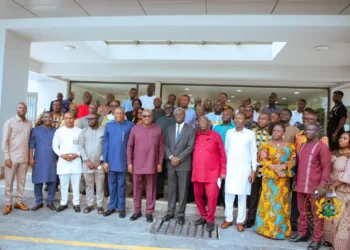In a closely contested election marked by previous disruptions, Yaw Owusu Obimpeh, the former Ashanti Regional Chairman of the National Democratic Congress (NDC), has been elected as the Ashanti Region’s representative to Ghana’s Council of State.
The election, held on February 17, 2025, at the Prempeh Assembly Hall in Kumasi, concluded with Obimpeh securing 49 out of 85 valid votes. His nearest rival, Nkansah Boadu Ayeboafo, garnered 35 votes, while Daniel Anarfi Yamoah received a single vote. One delegate was absent, and no ballots were rejected.
This successful election followed an earlier attempt on February 11, which was marred by violence during the sorting and counting of ballots. Unidentified individuals disrupted the process, leading to its suspension and necessitating a re-run.
In response to the initial chaos, the Electoral Commission (EC) relocated the venue to the more secure Prempeh Assembly Hall and implemented stringent security measures to ensure the integrity of the electoral process.
The enhanced security protocols included barricading all exits leading to the front of the assembly hall and restricting access to accredited individuals only.
Each accredited person, including two supporters per candidate, was photographed by police before being granted entry. These measures were instrumental in maintaining order during the re-run and preventing a recurrence of the previous disruptions.
The Ashanti Region’s Council of State election has been a focal point of political interest, given the region’s significant influence in national affairs. The initial election’s suspension raised concerns about the potential impact of electoral violence on democratic processes.
The EC’s decisive actions to address these challenges underscore the importance of safeguarding the integrity of elections and ensuring that the will of the electorate is accurately reflected.

Obimpeh’s victory is particularly noteworthy considering his affiliation with the NDC in a region traditionally dominated by the opposition. His election suggests a shift in the political landscape and indicates a broader acceptance of diverse political representation.
As a member of the Council of State, Obimpeh is expected to provide impartial and insightful advice to the President, drawing from his extensive political experience and deep understanding of the region’s unique challenges and opportunities.
The Council of State serves as an advisory body to the President, playing a crucial role in governance by offering counsel on national issues.
The inclusion of regional representatives ensures that diverse perspectives are considered in national decision-making and Obimpeh’s election adds a significant voice from the Ashanti Region, contributing to the council’s mandate of fostering inclusive and representative governance.
Resilient Democratic Institutions
The challenges encountered during the Ashanti Region’s Council of State election highlight the necessity for robust electoral systems capable of withstanding attempts to undermine democratic processes.
The EC’s proactive measures in response to the initial disruptions demonstrate a commitment to upholding the principles of free and fair elections. Ensuring the safety of all participants and the integrity of the vote count is paramount in maintaining public trust in electoral outcomes.
In the aftermath of the election, there have been calls for a thorough investigation into the causes of the initial violence to prevent future occurrences. Understanding the motivations behind such disruptions is essential in developing strategies to protect the democratic process.
Stakeholders, including political parties, security agencies, and civil society organizations, are urged to collaborate in promoting peaceful and transparent elections.
Obimpeh’s election also brings attention to the role of political leadership in fostering unity and development within the region.
As a Council of State member, he has the opportunity to advocate for policies that address the specific needs of the Ashanti Region, such as infrastructure development, education, and economic empowerment. His success in the election reflects the confidence that the delegates have in his ability to represent their interests effectively at the national level.
The Ashanti Region’s recent electoral experience serves as a reminder of the resilience of Ghana’s democratic institutions.
Despite challenges, the commitment to upholding democratic values remains steadfast. The successful conclusion of the Council of State election, with Yaw Owusu Obimpeh as the elected representative, marks a positive step forward in ensuring that the voices of all regions are heard in the governance of the nation.
Obimpeh prepares to assume his role on the Council of State and the focus now shifts to how he will leverage his position to benefit the Ashanti Region and contribute to national development.
READ MORE: Ghana’s Economic Stability: Government Urged to Walk the Talk





















